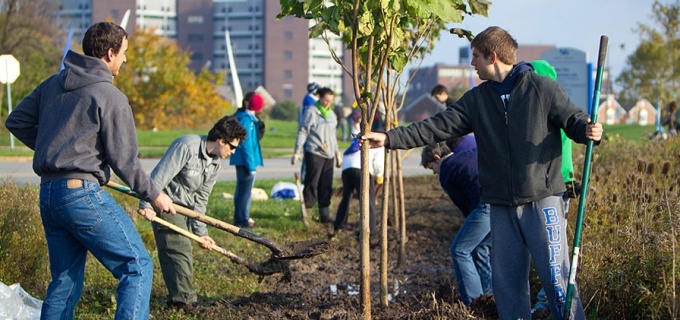Advanced Certificate in Sustainability

Graduate-level Training for a More Sustainable World
Want to lead on sustainability in your field—without committing to a full master’s degree (yet)? The Advanced Certificate in Sustainability is a 15-credit graduate program designed to complement your current studies or professional path.
Whether you’re a scientist, artist, engineer, educator, planner or policy maker, this certificate gives you the foundational knowledge and tools to think systemically—and act effectively—on today’s environmental challenges.
Learn about:
This certificate equips you to:
- Understand how environmental, social, and economic systems interac
- Examine the cultural values and behaviors that shape sustainability
- Analyze human impacts on natural systems, and develop responsible solutions
- Apply systems thinking across disciplines
15 credits | 5 courses | Flexible schedule
You’ll take:
- Required: Fundamentals of Sustainability (SSN 501) — Fall only
- Required: Sustainability Professional Skills Capstone (SSN 601) — Spring only
- 1 environmental course
- 1 social/cultural course
- 1 economic/business course
Courses are interdisciplinary and offered across departments, giving you a wide lens on sustainability practice and theory.
Already in the MA in Sustainability Leadership? These credits count toward that degree, too.
- Gain broad, systems-level knowledge across disciplines
- Strengthen your credentials—stand out for jobs or advanced study
- Join a vibrant cross-campus community of students and faculty
- Lead more sustainable practices in your field or organization
- Complete the certificate on your own timeline
This program is open to:
- Current UB graduate students (any discipline)
- Working professionals or returning students seeking graduate credentials
- Those considering the MA in Sustainability Leadership (you can apply this credit later)
Deadline: April 15
Applications after that are reviewed on a rolling basis. Apply early for the best course selection.
Current UB College of Arts and Sciences grad student? Complete the Sustainability Advance Certificate Request Form
Outside College of Arts and Sciences or not enrolled at UB? Apply by completing the Graduate Enrollment Services form
We’re here to help. If you have questions about the program, the final project, or planning your course path, get in touch.
